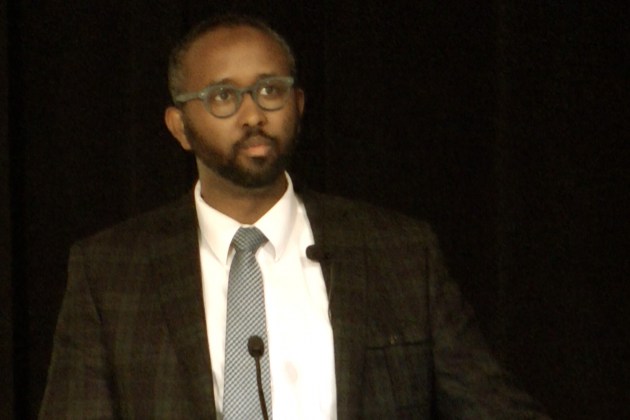
RNA - “Somali Americans are going to be deported when Donald Trump, becomes president. You, people, are terrorists and killers”.
As those two voicemails projected in the Atwood Ballroom as the Sociologists of Minnesota conference took place, you could see the disbelief on the faces of people in the crowd.
Tonight, Jaylani Hussein, executive director of the council of American-Islamic Relations played two different hate calls that the council of American-Islamic Relations (CAIR) and Somali-American museum received recently. Hussein says he played these voicemails to show the crowd that Islamophobia does exist.
“I wanted to give the audience a reality check that this is actually happening. We get a lot of these hate calls and emails. Typically one a month or more says, Hussein”
To Hussein and other Muslims, these are the issues they must face on a daily basis and no matter how many calls CAIR and other organizations receive. Hussein says he will not stop advocating and bringing awareness.
“This is a critical time for our history says, Hussein. We don’t want to repeat past religious intolerance we have done to other groups. This is a time we realize that we all need to come together. We all need to make a bigger impact”
And in order to see a difference being made, Hussein says it starts with him sharing the facts and presenting the data to the experts in the sociology field like Matthew Lust.
Lust is a professor of sociology at South Central College in Mankato. He says although, there is a fairly sizeable Somali population. Him being at the conference provides him with a greater insight into the experiences of his students.
“The biggest thing I have taken away is that silence is complicity. It’s very easy to say, I don’t like something, I don’t support it or I don’t believe it. However, you need to speak out says Lust”
As these conversations continue Hussein says more has to be done. He says despite the incident that took place in the past week in St. Cloud, he’s hopeful the community can come together and tackle the issue of Islamophobia.
“We are moving together as a community. We are not going to allow terrorist groups or anybody to divide our community. Instead, we are going to come together and be resilient”
In order for fear or generalizing of groups to stop. Hussein says conversations need to happen, people need to challenge themselves, learn and get out of their comfort zone.
847/940